-
Countries
-
Data and Analysis
-
Special Focus
-
Crisis Responses
Return migration

Contact
DTM REMAP Support Team (dtmremapsupport@iom.int); DTM REMAP Bangladesh Team (remapbd@iom.int)
Language
English
Location
Bangladesh
Period Covered
May 12 2022
Jun 08 2022
Activity
- Mobility Tracking
- Baseline Assessment
As the COVID-19 pandemic emerged globally, migrant workers, both internationally and within Bangladesh, found themselves facing a new set of challenges and vulnerabilities. With limited access to income-generating activities, social services, healthcare systems, and social support networks, many have opted to return home. Two years after the first cases of COVID-19 emerged in Bangladesh, the impacts of the pandemic continue to be felt in the country, albeit in smaller waves. During May and June 2022, IOM conducted a third round of data collection, supported by the European Union under the regional program REMAP and in coordination with the Research and Policy unit of the Ministry of Expatriates’ Welfare and Overseas Employment, Bangladesh, along with the NPM team based in Cox’s Bazar, to further enhance the understanding of economic impacts and relevant challenges related to COVID-19 in Bangladesh while focusing on a longitudinal perspective and analysis.
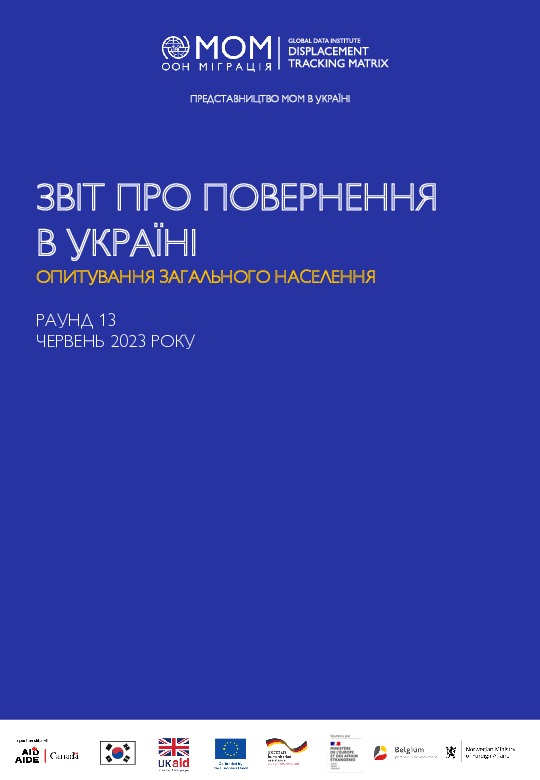
Contact
DTMUkraine@iom.int
Language
Ukrainian
Location
Ukraine
Period Covered
May 11 2023
Jun 14 2023
Activity
- Survey
Після 24 лютого 2022 року повномасштабне вторгнення Російської Федерації (РФ) в Україну спричинило безпрецедентну гуманітарну кризу по всій країні. У період з 11 травня по 14 червня 2023 року Міжнародна організація з міграції (МОМ) у два етапи провела раунд 13 репрезентативного оцінювання загального населення України для збору інформації стосовно переміщення, потоків мобільності, намірів та умов для інформаційного забезпечення цільової допомоги населенню, що постраждало від війни. Починаючи з раунду 13, методологію опитування було адаптовано для отримання репрезентативних квартальних даних на рівні областей. Крім того, в цьому раунді запроваджено новий блок питань щодо довгострокових рішень проблеми внутрішнього переміщення згідно з критеріями, пропонованими Рамковою програмою Міжвідомчого постійного комітету щодо довгострокових рішень для ВПО. Опитування загального населення має на меті сприяти ухваленню обґрунтованих рішень у стратегічному, технічному та програмному аспектах діяльності з реагування та відновлення в Україні, у тому числі Урядом України. Географічне охоплення цього оцінювання покриває всю територію України, за винятком Автономної Республіки Крим та районів Донецької, Луганської, Херсонської та Запорізької областей, які перебувають під тимчасовим військовим контролем РФ. Опитування загального населення було проведено шляхом набору випадкових телефонних номерів, завдяки чому було анонімно опитано 5 297 унікальних респондентів віком від 18 років із використанням методу автоматизованого телефонного опитування (CATI). Оцінки базуються на даних про населення ЮНФПА (останні доступні дані станом на 14 листопада 2022 р.), які гуманітарна спільнота розглядає як базове значення для чисельності населення в Україні. Особи, які наразі перебувають за межами України, під опитування не потрапили.

Contact
DTMUkraine@iom.int
Language
English
Location
Ukraine
Period Covered
May 11 2023
Jun 14 2023
Activity
- Survey
To support partners in providing targeted and evidence-based assistance to the most vulnerable among those who have returned to their areas of habitual residence after a period of forced displacement, the Data and Analytics team of IOM Ukraine is pleased to present the Ukraine Returns Report (Round 13). Starting from June 2023, IOM has transitioned to quarterly implementation of the General Population Survey, providing representative data at the oblast level. The survey was conducted in two phases from 11 May to 14 June 2023. Round 13 offers valuable information on demographics, return dynamics, and intentions of those who have been displaced within Ukraine and abroad (with integrated data and analysis from the IOM Regional Office in Vienna). It also provides detailed insights into household income, employment status, and living conditions of the returnee population. Additionally, it brings previously unavailable data on return as a durable solution in Ukraine, assessing the returnees’ situation along the Inter-Agency Standing Committee (IASC) Durable Solutions criteria, along with elements of social cohesion among the different population groups. The aim is to support evidence-based decision-making on strategic, technical, and programmatic aspects of response and recovery efforts in Ukraine, including the Government of Ukraine. For the purposes of this report, the terms "return” and "returnee” are used without prejudice to status and refer to all persons de-facto in their place of habitual residence after a significant period of displacement (minimum of two weeks since February 2022), regardless of whether they returned to these locations spontaneously from abroad or from displacement within Ukraine. This definition excludes those who have come back to Ukraine from abroad but who have not returned to their places of habitual residence in country.
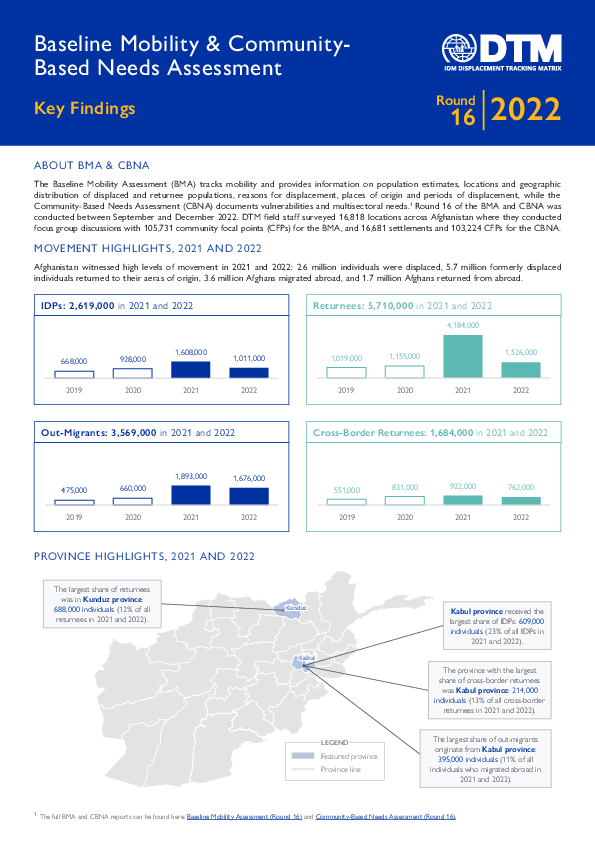
Contact
DTMAfghanistan@iom.int
Language
English
Location
Afghanistan
Period Covered
Sep 01 2022
Dec 31 2022
Activity
- Mobility Tracking
- Baseline Assessment
DTM has been conducting the Baseline Mobility Assessment (BMA) in Afghanistan since 2016 to track mobility, provide information on population estimates, locations and geographic distribution of displaced and returnee populations, reasons for displacement, places of origin and periods of displacement. The Community-Based Needs Assessment (CBNA) provides a comprehensive overview of the evolving vulnerabilities and multisectoral needs in communities hosting internally displaced persons (IDPs) and returnees from abroad.
Data is collected at the settlement level through focus group discussions with community focal points and direct observation. The figures presented in the report are estimates provided by community focal points.
The key findings report summarizes the results of Round 16 (Sep to Dec 2022) of the BMA and CBNA, focusing on the 2021-to-2022 period.
The full reports can be found here: Baseline Mobility Assessment and Community-Based Needs Assessment.
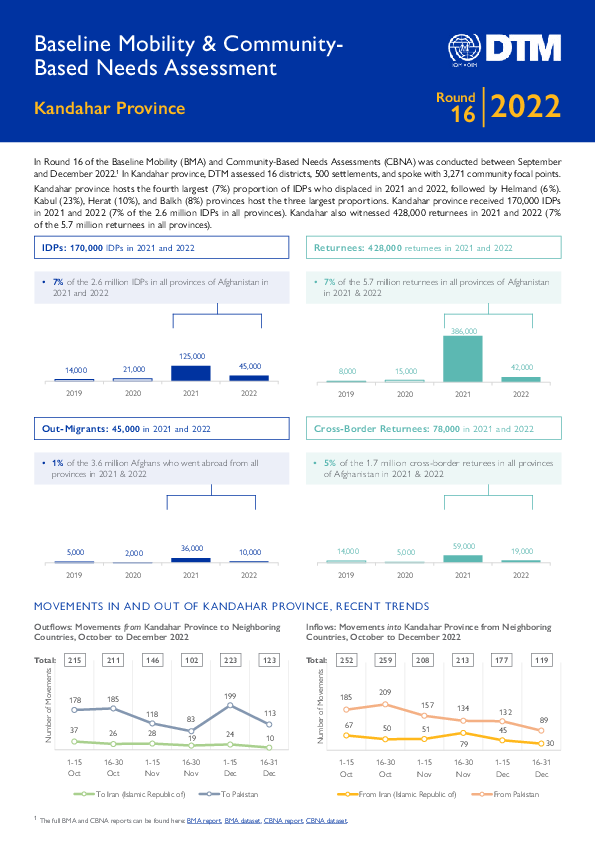
Contact
DTMAfghanistan@iom.int
Language
English
Location
Afghanistan
Period Covered
Sep 01 2022
Dec 31 2022
Activity
- Mobility Tracking
- Site Assessment
- Baseline Assessment
DTM has been conducting the Baseline Mobility Assessment (BMA) in Afghanistan since 2016 to track mobility, provide information on population estimates, locations and geographic distribution of displaced and returnee populations, reasons for displacement, places of origin and periods of displacement. The Community-Based Needs Assessment (CBNA) provides a comprehensive overview of the evolving vulnerabilities and multisectoral needs in communities hosting internally displaced persons (IDPs) and returnees from abroad.
Data is collected at the settlement level through focus group discussions with community focal points and direct observation. The figures presented in the report are estimates provided by community focal points.
This factsheet delves into the key findings in Kandahar province using the latest results from Round 16 (Sep to Dec 2022) of the BMA and CBNA, focusing on the 2021-to-2022 period.
The full report can be found here: Baseline Mobility Assessment and Community-Based Needs Assessment.
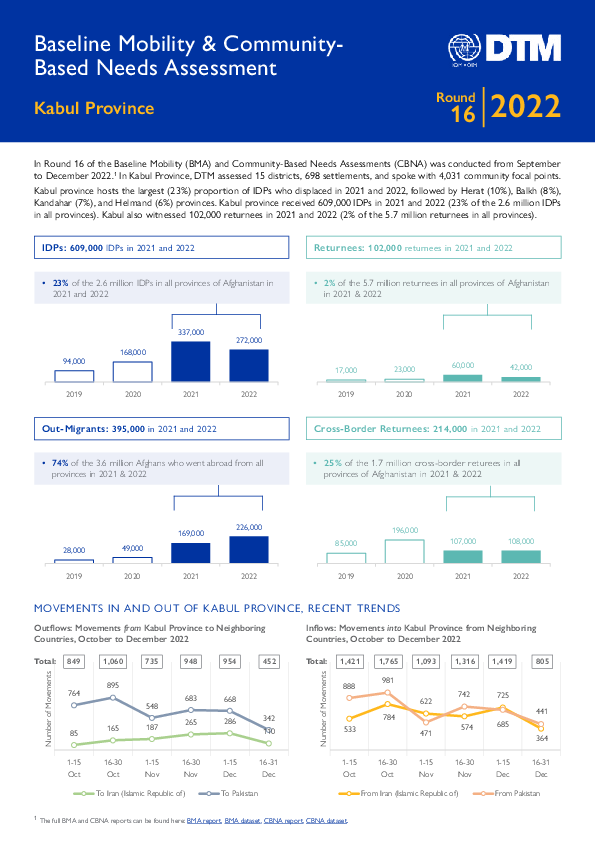
Contact
DTMAfghanistan@iom.int
Language
English
Location
Afghanistan
Period Covered
Sep 01 2022
Dec 31 2022
Activity
- Mobility Tracking
- Site Assessment
- Baseline Assessment
DTM has been conducting the Baseline Mobility Assessment (BMA) in Afghanistan since 2016 to track mobility, provide information on population estimates, locations and geographic distribution of displaced and returnee populations, reasons for displacement, places of origin and periods of displacement. The Community-Based Needs Assessment (CBNA) provides a comprehensive overview of the evolving vulnerabilities and multisectoral needs in communities hosting internally displaced persons (IDPs) and returnees from abroad.
Data is collected at the settlement level through focus group discussions with community focal points and direct observation. The figures presented in the report are estimates provided by community focal points.
This factsheet delves into the key findings in Kabul province using the latest results from Round 16 (Sep to Dec 2022) of the BMA and CBNA, focusing on the 2021-to-2022 period.
The full report can be found here: Baseline Mobility Assessment and Community-Based Needs Assessment.

Contact
DTMAfghanistan@iom.int
Language
English
Location
Afghanistan
Period Covered
Sep 01 2022
Dec 31 2022
Activity
- Mobility Tracking
- Site Assessment
- Baseline Assessment
DTM has been conducting the Baseline Mobility Assessment (BMA) in Afghanistan since 2016 to track mobility, provide information on population estimates, locations and geographic distribution of displaced and returnee populations, reasons for displacement, places of origin and periods of displacement. The Community-Based Needs Assessment (CBNA) provides a comprehensive overview of the evolving vulnerabilities and multisectoral needs in communities hosting internally displaced persons (IDPs) and returnees from abroad.
Data is collected at the settlement level through focus group discussions with community focal points and direct observation. The figures presented in the report are estimates provided by community focal points.
This factsheet delves into the key findings in Herat province using the latest results from Round 16 (Sep to Dec 2022) of the BMA and CBNA, focusing on the 2021-to-2022 period.
The full report can be found here: Baseline Mobility Assessment and Community-Based Needs Assessment.
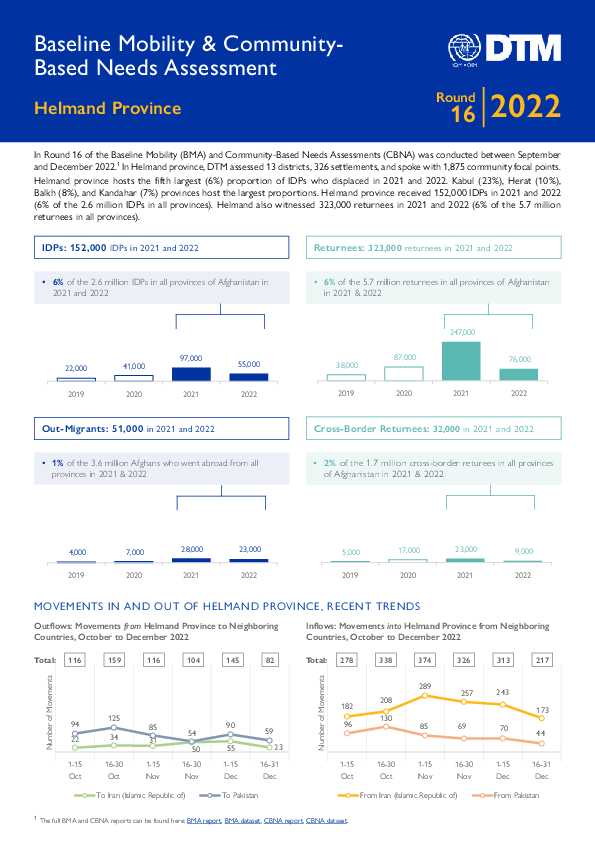
Contact
DTMAfghanistan@iom.int
Language
English
Location
Afghanistan
Period Covered
Sep 01 2022
Dec 31 2022
Activity
- Mobility Tracking
- Site Assessment
- Baseline Assessment
DTM has been conducting the Baseline Mobility Assessment (BMA) in Afghanistan since 2016 to track mobility, provide information on population estimates, locations and geographic distribution of displaced and returnee populations, reasons for displacement, places of origin and periods of displacement. The Community-Based Needs Assessment (CBNA) provides a comprehensive overview of the evolving vulnerabilities and multisectoral needs in communities hosting internally displaced persons (IDPs) and returnees from abroad.
Data is collected at the settlement level through focus group discussions with community focal points and direct observation. The figures presented in the report are estimates provided by community focal points.
This factsheet delves into the key findings in Helmand province using the latest results from Round 16 (Sep to Dec 2022) of the BMA and CBNA, focusing on the 2021-to-2022 period.
The full report can be found here: Baseline Mobility Assessment and Community-Based Needs Assessment.
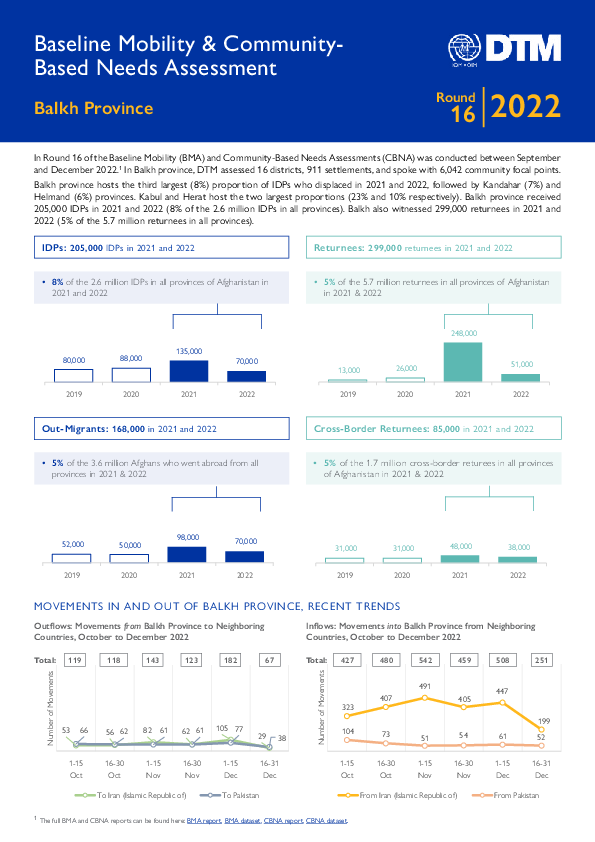
Contact
DTMAfghanistan@iom.int
Language
English
Location
Afghanistan
Period Covered
Sep 01 2022
Dec 31 2022
Activity
- Mobility Tracking
- Site Assessment
- Baseline Assessment
DTM has been conducting the Baseline Mobility Assessment (BMA) in Afghanistan since 2016 to track mobility, provide information on population estimates, locations and geographic distribution of displaced and returnee populations, reasons for displacement, places of origin and periods of displacement. The Community-Based Needs Assessment (CBNA) provides a comprehensive overview of the evolving vulnerabilities and multisectoral needs in communities hosting internally displaced persons (IDPs) and returnees from abroad.
Data is collected at the settlement level through focus group discussions with community focal points and direct observation. The figures presented in the report are estimates provided by community focal points.
This factsheet delves into the key findings in Balkh province using the latest results from Round 16 (Sep to Dec 2022) of the BMA and CBNA, focusing on the 2021-to-2022 period.
The full report can be found here: Baseline Mobility Assessment and Community-Based Needs Assessment.
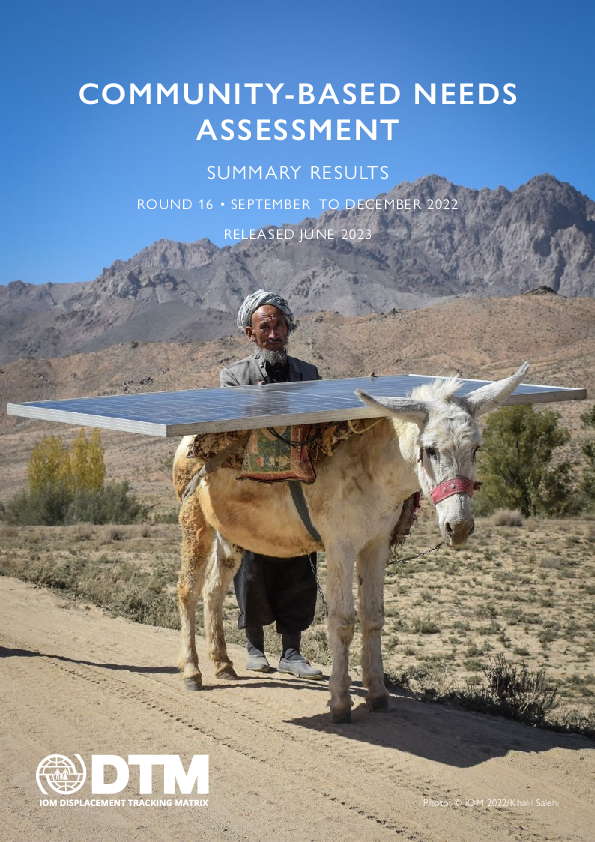
Contact
DTMAFGHANISTAN@iom.int
Language
English
Location
Afghanistan
Period Covered
Sep 01 2022
Dec 31 2022
Activity
- Village Assessment
DTM Afghanistan conducts the Community-Based Needs Assessment (CBNA) as an integral component of DTM's Baseline Mobility Assessment (BMA), which (in a jointly released report) tracks mobility and displacement. The CBNA provides a comprehensive overview of the evolving vulnerabilities and multisectoral needs in communities hosting internally displaced persons (IDPs) and returnees from abroad. The figures presented in the report are estimates provided by community focal points (CFPs).
Pagination
- Previous page
- Page 6
- Next page
